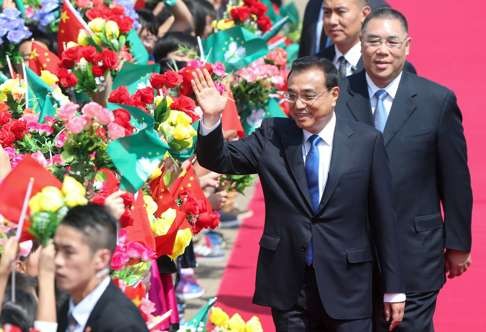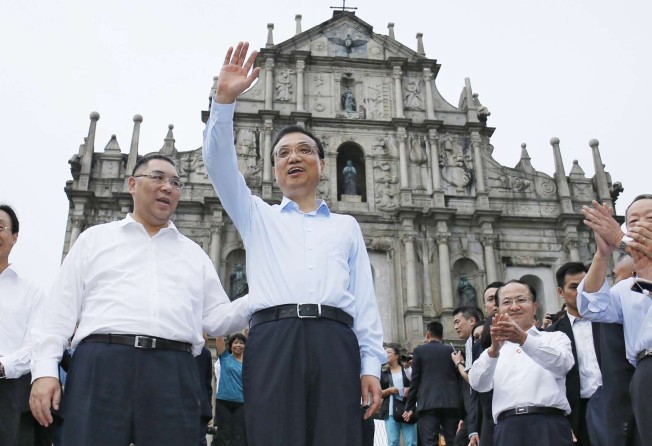
Li Keqiang’s support for Forum Macau speaks volumes of Beijing’s soft diplomatic approach
Three-day visit boosted a fragile local economy, and allowed him to touch base with struggling BRICS partner Brazil, oil-rich Angola, and EU member Portugal

On the face of it, one has to puzzle why Premier Li Keqiang, with Commerce Minister Gao Hucheng tagging along for good measure, should have spent three days in Macau last week in a huddle with the Forum Macau – that improbable grab bag of mostly tiny economies that share one thing in common – their reliance on the Portuguese language.
After all, this is not the Group of 20, or the 21-member Asia Pacific Economic Cooperation (APEC) Grouping, or the Pacific Alliance or the 10-Member Association of South East Asian Nations (ASEAN).
With the exceptions of Brazil, Angola, Portugal and of course Macau, these are tiny relic economies orphaned by the 1974 collapse of Portugal’s empire. Mention Cape Verde or Guinea-Bissau or Sao Tome or Timor-Leste, and you will be hard-pressed to find them on a world map, let alone as footnotes on World Bank GDP or population tables.
Six of the 10 members have a population below 2 million, and six sit in the bottom hundred of the world’s poorest economies.
But the fact that Premiere Li is willing to devote three precious days with them speaks volumes. First, and most important I suppose, is the need to give a bit of a boost to troubled Macau.
After gaming revenues crashed by 34 per cent last year, its economy shrank by around 21 per cent, prompting Macau’s leaders to call for urgent efforts to diversify the economy.
Using this fifth Ministerial Conference of the Forum for Economic and Trade Cooperation between China and Portuguese-speaking economies to position Macau as a financial centre for the Lusophone economies may not amount to much in the way of diversification, but if you are grabbing for straws it is worth remembering that back in Macau’s halcyon days four centuries ago, it played an indispensable role linking China to Europe via Goa, to Japan via Nagasaki, and to Mexico via Manila.
Who knows what changes the coming century will bring?
Second, it speaks volumes for the “soft diplomacy” outreach being developed by Beijing as it aims to build greater influence across the world economy. Look at the One Belt, One Road strategy which embraces 64 countries, but in particular the long-neglected economies in Central Asia like Kazakhstan, Turkmenistan and Uzbekistan. Look at the Forum on China-Africa Cooperation or the China-Africa Business Council that have been nurturing links with the African continent since the early 1980s. So too this hodge-podge of Lusophone countries.
As China emerged virtually friendless in 1978 after two decades in thrall to Mao and stepped into a world strategically dominated by the United States and Europe, it turned for friendship to similarly unfriended nooks and crannies around the world. They might seem humble and marginal today, but in decades to come?
Third, perhaps three of the Forum Macau economies alone justified the time spent – Brazil, Angola and Portugal: the first because of its importance to China as a trading partner for a wide range of natural resources; the second because of oil and gas; and the third because of its bridgehead role into the European Union.

China’s perspective is unflinchingly long-term, and this recent economic trauma is unlikely to deter diplomatic outreach – in particular if it is accompanied by generous investment.
But still surely it is a stretch to imagine Macau as a credible bridge linking together the Lusophone world. It is true that Macau can claim an illustrious Portuguese colonial history stretching back more than four centuries to 1557, but today less than 1 per cent of its 500,000 population is ethnically Portuguese, and fewer than 3 per cent boast an ability to speak Portuguese. With more than three times as many Filipinos working in the economy as Portuguese, Macau can make a better claim to link the Tagalog-speaking world than the Portuguese.
Forum Macau may have been a get-together for the Portuguese-speaking world, but I wonder how many local or mainland participants had to grab for simultaneous translation headphones whenever any speaker at the forum tried to speak Portuguese .
In one respect, China has no choice but to embrace the Lusophone world: the preposterous decision to base Macau’s legal system on the Portuguese legal system means it is almost wholly dependent on legal professionals flown in from Portugal (undoubtedly a large proportion of the 8,100 Portuguese living in Macau). There was some modest sense in retaining the British Common Law legal system in Hong Kong given the pervasiveness of common law contracts in international business, but contracts built upon Portuguese Law? Surely this is not much of a competitive advantage in terms of international business connectivity.
But perhaps with not too much tongue-in-cheek there might be the germ of a good idea here for Hong Kong to consider. Why not a Forum Hong Kong which focuses on economic and trade cooperation between China and the British Commonwealth? This would surely be an old colonial grouping that might be truly significant – and would much more readily justify three days of attention from Li Keqiang.
With 53 member countries and a total population of 2.33 billion (thanks to the inclusion of India), the Commonwealth Forum would embrace (with China included) more than half of the world’s population. The combined GDP of the Commonwealth countries amounted at the end of 2015 to $10.45 trillion – about five times the size of the Lusophone group, and only just short of China’s own $11.5 trillion GDP.
I am sure meetings would rely much less heavily on simultaneous translation headphones – and instead of feasting on Bacalau, African Chicken and Portuguese Douro, imagine the pleasure of Indian curries, Kenyan coffee and Canadian ice-wine. There is definitely the germ of an idea here. If only Hong Kong were a member of the Commonwealth.
David Dodwell researches and writes about global, regional and Hong Kong challenges from a Hong Kong point of view